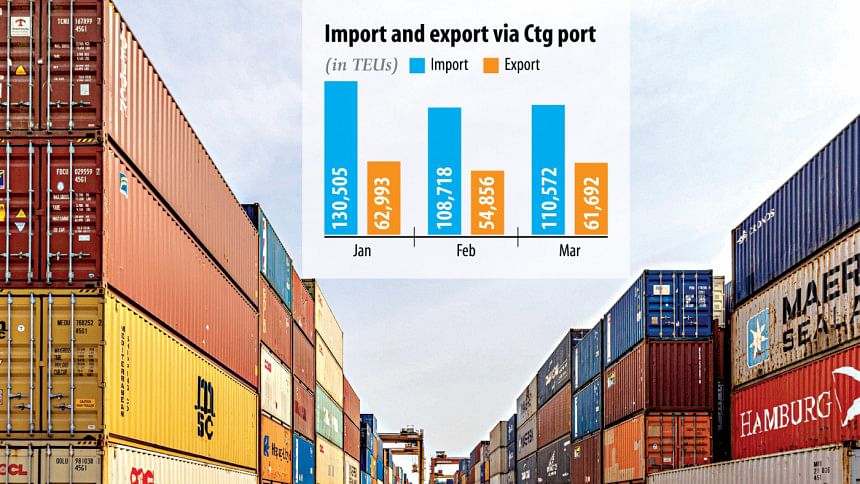Logistics industry rattled

The logistics and freight forwarding business in Bangladesh has been devastated by the global coronavirus pandemic, which has led to a nosedive in transportation of goods by land, air and sea.
Of the 3.5 lakh-odd trucks and covered vans engaged in the transportation of goods between Dhaka, its adjacent districts and Chittagong port, nearly 70 per cent carry textile and garment items, while the rest transport products for other sectors.
And since most of the garment factories are now closed, their business has hit rock-bottom, industry insiders said.
During the shutdown, transportation of other goods like vegetables and construction materials is very scarce, said Syed Md Bakhtiar, executive president of Bangladesh Truck and Covered Van Owners Association.
The average price of a truck or van is Tk 20 lakh and it fetches them Tk 2.5 lakh per month.
"Although we have no income now, we have to pay salaries of the drivers and other staff," he said, adding that they also have to pay bank loans as most of the vehicles were bought on credit.
The 30.5 lakh people directly and indirectly employed in the sector are sitting idle now, Bakhtiar added.
Freight forwarding business has also come to a halt due to the new situation, said Kabir Ahmed, president of the Bangladesh Freight Forwarders Association (BAFFA).
For instance, on a usual day, some 600 tonnes of cargoes are imported via Hazrat Shahjalal International Airport but the quantity has dropped to only 250 tonnes a day now.
About 800 tonnes of goods were exported through the airport on a normal day, but the volume has now fallen to 50 tonnes.
Of the export consignments sent through the airport, 70 per cent are textile and garment items.
The cargo village at the airport is also taking the strain due to slow delivery of goods amid the ongoing countrywide movement control order: though about 250 tonnes goods pile up in the cargo village every day, only 50 tonnes are delivered.
So far more than 2,000 tonnes of goods have been stockpiled in the cargo village that has a capacity of 800 tonnes.
Subsequently, valuable goods are left under the open sky and unattended, leading to deterioration in their quality, Ahmed said.
The BAFFA is planning to seek faster delivery of goods from the cargo village from the customs commissioner, he said, adding that they have informed the commerce ministry last week that the freight forwarders have incurred losses of Tk 1,500 crore over the last one and a half months.
Moazzem Hossain, commissioner of Dhaka customs house, said they are working seven days a week to deliver the imported goods from the cargo village at the airport.
Many importers are not taking delivery of their goods on time, which has led to congestion at the cargo village, he added.
M Mafidur Rahman, chairman of the Civil Aviation Authority of Bangladesh, also said they are providing round-the-clock services for faster delivery of the imported goods from the Dhaka airport.
But the backlog doesn't seem to be clearing up fast enough.
SHIPPING INDUSTRY IN A ROUGH PATCH
The container shipping industry that was first dealt a blow in January by an import crunch amid the coronavirus outbreak in China is facing new shocks now.
Though import volume slightly increased since February with Chinese factories gradually resuming production, the sector is bogged down by a dearth of export consignments and container congestion at Chattogram port.
Import of containerised cargo through the port fell 16.70 per cent to 108,718 TEUs (twenty feet equivalent units) in February from the previous month, according to data from shipping agents.
A total of 134 container vessels arrived at the port in February, against 154 in January.
Since most of the raw materials for the garment sector are brought from China, the supply was heavily disrupted in January and February when Chinese factories suspended production, said Shahed Sarwar, deputy managing director of Chowdhury Group, local agent of feeder operating firms Feedertech and Foremost Maritime.
Vessels hardly get 40 per cent of the expected import cargoes while some vessels had to remain idle.
"We had to drop one of the vessels from our fleet," he added.
Since the last week of March the volume of export consignments has been witnessing a drastic fall as most of the local garment factories remain closed, Sarwar said.
A vessel named Delaware Trader that left the port on April 4 got only 590 TEUs of export containers, while the vessel used to ship 2,200 TEUs to 2,300 TEUs on usual days.
Md Ajmir Hossain Chowdhury, assistant general manager of the ship's local agent Marco Shipping Company (BD), said feeder operators are counting huge losses for carrying such a poor number of export containers.
Slow delivery of imported goods from Chattogram port has created acute container congestion resulting in long queues of vessels. A total of 36 container vessels were waiting at the outer anchorage yesterday.
Vessels are now forced to wait for seven to eight days at the outer anchorage and thus the operators are counting a huge amount of losses since they have to bear an additional charge of $10,000 to $16,000 for each day of idle stay, said Ahsanul Hoque Chowdhury, chairman of Bangladesh Shipping Agents Association.



 For all latest news, follow The Daily Star's Google News channel.
For all latest news, follow The Daily Star's Google News channel. 



Comments